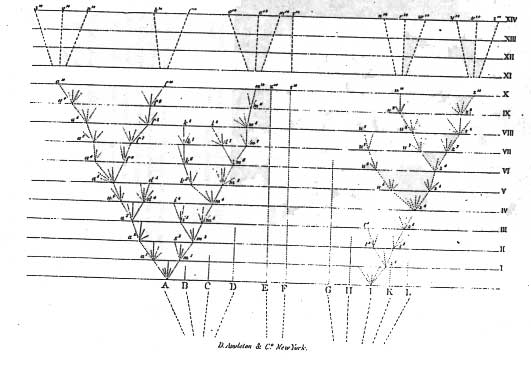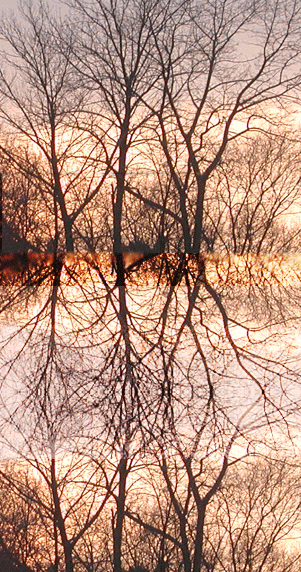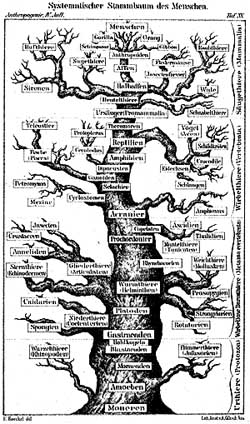change (=historicity) is a narrative story-telling style, ie it presumes that one accounts for the ways things are in the present based on what happened in the past. This style has several variants:
Catastrophism:
the present can be understood in terms of events in the past (eg the Flood) which themselves cannot be readily understood in terms of principles operating in the present
Uniformitarianism:
the present can be understood in terms of events in the past which themselves can be readily understood in terms of principles operating in the present
Evolutionism = current life forms are variants of previously existing life forms with transformations "being the result of law [observable in present], and not of miraculous interposition" ("how remote is it from all that is generally thought on this subject" ?). What was special about Darwin and what followed from him was not "historicity" and not even the refusal to make use of "miraculous interposition" as a story-telling device but the particulars of the principles operating to produce change ....
heritability (continuity)
random variation (catastrophism?)
differential reproductive success (catastrophism?)
| Darwinian/evolutionary story telling | Other kinds of story telling |
|---|
Population thinking and continuous largely undirected change
- individuals vary in substantial and important ways
- classes represent groups of individuals with common ancestry
- classes change more or less smoothly and continously into other classes, with no sharp borders nor permanent characteristics
- "organization" is a description of the present, depends on past, may be different in future
- two factors contribute to that change:
- random variation
- differential reproductive success
- therefore change has some direction (expansion)
and some shaping (differential reproductive success)
- would not come out the same way in detail if repeated, has no end state to be achieved .... is exploration of possible forms within some set of poorly defined constraints, is playful
| Essentialism
- individuals are members of invariant classes
- invariant classes (and membership of individuals in them) are defined by essences
- variation among individuals is of minor significance or irrelevant
Finalism
- change is toward "ever greater perfection"
- change reflects individual and personal experience (Lamarck)
|
Raised issues not only about past but about future (predictability? progress? purpose/meaning?).
| "Evolution in the sense of common ancestry might be true, but evolution in the neo-Darwinian sense -- an unguided, unplanned process of random variation and natural selection -- is not. Any system of thought that denies or seeks to explain away the overwhelming evidence for design in biology is ideology, not science"
... Christopher Schönborn, New York Times, 2005
|
Raises issues also about science, literature, life?
On randomness and order
 "It is sometimes claimed that evolution, by producing order, is in conflict with the "law of entropy" of physics, according to which evolutionary change should produce an increase of disorder. Actually, there is no conflict, because the law of entropy is valid only for closed systems, whereas the evolution of a species of organisms takes place in an open system in which organisms can reduce entropy at the expense of the environment and the sun supplies a continuing source of energy" (p 8)
"It is sometimes claimed that evolution, by producing order, is in conflict with the "law of entropy" of physics, according to which evolutionary change should produce an increase of disorder. Actually, there is no conflict, because the law of entropy is valid only for closed systems, whereas the evolution of a species of organisms takes place in an open system in which organisms can reduce entropy at the expense of the environment and the sun supplies a continuing source of energy" (p 8)
| Directionless change ("expansion", consistent with "law of entropy") can yield directed change; the two are not only not in conflict but may be mutually dependent. See
|
Will deal with all the above in more detail, but first the principal question for a scientific story:
What are the observations being summarized?
|
Not quite the same thing as "evidence for evolution" (p12) ... supported by such an overwhelming amount of evidence that it could no longer be called a theory ... had to be considered a fact, like ethnocentricity ... most inferences made by evolutionists have by now been tested successfully so often that they are accepted as certainties" ... for better or for worse?
|
| Clumpy diversity |
|---|

|
Need to account for
- huge diversity
- non-random pattern ("There seemed to be basic conflict between the overwhelming diversity of life and the observation that certain groups of organisms often shared the same characteristics" p 22)
- clumping at multiple scales
- general commonalities, many only recently visible, underlying differences
- directionality?
- biogeography
- embryology
- fossils
- "adaptiveness" - significant but also tautological, "good enough"
Can do #1-5 with "common descent" (p 21) and reproduction with variance
Need differential survival for #6?
"Anagenesis" from common descent and reproduction with variance?
- leads on to importance of "population thinking", non-essentialism, history dependence
- could involve AS WELL "directedness"/adaptation/death
"Cladogenesis" also from common descent and reproduction with variance (assuming multiple starting points)
- leads on to recognition of fundamental nature of diversity
- could involve AS WELL "directedness"/adaptation/death
|
Additional observations: Looking Backwards in Time
|
"Darwin's theory of common descent postulates that every group of organisms is derived from an ancestral group. An ancestral group, in turn, may have several descendent groups ... What is most gratifying is that all findings are consistent with Darwin's theory of common descent"
doesn't "postulate"; it "suggests", and the observations themselves help to define the current story
|
- LONG time
- Yes, change; yes, ancestral populations observable (in many cases)
- Yes, slow and continuous change (in many cases); yes, abrupt/quick change (in many cases); yes, splitting (in many cases)
- Yes, differential survival (death), and therefore adaptation
- Yes, randomness/messiness
- No, no movement toward "superior"; in fact no way to define "superior"
- continual change in selection, including life itself
- interaction/cooperation/making possible novel forms as much a part of the story as competition/elimination
- significant internal dynamics, including increasing complexity
- Story continuing ... (as is "story" of story)
- serious uncertainty about homogeneity/heterogeneity of "original" population
- related interesting uncertainty about origins of modern human population
- dramatic change always externally caused or could also be internal dynamics?
- lateral spread
| 
|
The current status of the story of evolution
| "in the 1940's a farreaching consensus or evolutionary synthesis was reached" (the latter more than the former) ... "enough facts were available after 1859 to have permitted the universal acceptance" (would that have been good?) ... "refuted the opposing ideologies ... introduced the new concepts" (developed and made available not only a new story but a new story telling style?)
|
Summarizes LOTS of information
Is useful
- better understanding of medicine
- new technologies
- new appreciation of connectedness of humans to other organisms
Causes one to see things in new ways, raises new questions
| "A population or species changes through the continuous production of new genetic variation and through the elimination of most members of each generation, because they are less successful either in the process of the nonrandom elimination of individuals or in the process of sexual selection (i.e., they have less reproductive success)" (p 77, Box 4.1)
|
Yes, but more to story than descent with variance and selection ... a story in progress (there is certainly more going on
- interdependence, creative exploration, generation of new possibilities
- likelihood of explanations of catastrophic change other than external factors - complexity and collapse?
- problem of accounting for cooperation/altruism - co-evolution? still less local influences?
- likelihood of inertial factors other than selection - genotype cohesion?
- likelihood of controls on randomness/exploration - mutation regulation
- likelihood of exchange other than by genetic transmission - lateral spread
- problem of origins of evolutionary process - from inanimate to life?
- problem of appearance of consciousness, culture
- problem of intersection of genetic change and cultural change
The narrative versus non-narrative distinction, significant beyond biological evolution?
| Course Home Page
| Forum
| Science in Culture
| Serendip Home |


 "It is sometimes claimed that evolution, by producing order, is in conflict with the "law of entropy" of physics, according to which evolutionary change should produce an increase of disorder. Actually, there is no conflict, because the law of entropy is valid only for closed systems, whereas the evolution of a species of organisms takes place in an open system in which organisms can reduce entropy at the expense of the environment and the sun supplies a continuing source of energy" (p 8)
"It is sometimes claimed that evolution, by producing order, is in conflict with the "law of entropy" of physics, according to which evolutionary change should produce an increase of disorder. Actually, there is no conflict, because the law of entropy is valid only for closed systems, whereas the evolution of a species of organisms takes place in an open system in which organisms can reduce entropy at the expense of the environment and the sun supplies a continuing source of energy" (p 8)


